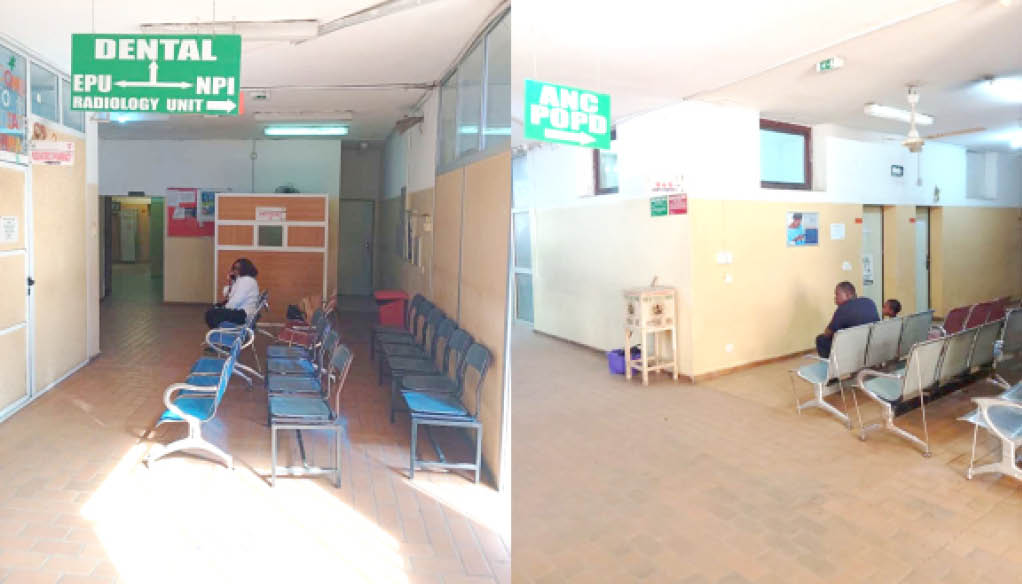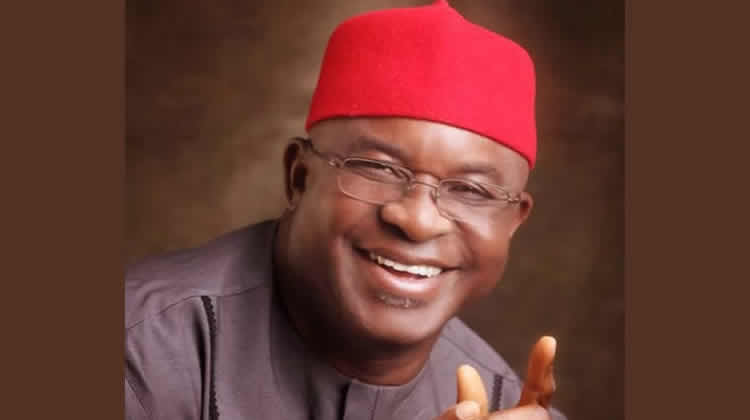
Patients were left stranded on Monday as the strike by resident doctors crippled medical services across the six area councils of the Federal Capital Territory (FCT).
The doctors commenced a seven-day warning strike on Monday over what they called systemic failures in the FCT’s health sector
Resident doctors are medical school graduates training as specialists. They dominate the emergency wards of hospitals in Nigeria and are crucial to quality healthcare delivery nationwide.
Mary Adegbenro, a visiting patient who was in the Kubwa general hospital to start her antenatal process, said she was left with no option but to go to a private hospital.
Mary’s husband, Tunde, told our reporter that: “We are surprised by this news because my wife is pregnant and was told to come today, so she could start her antenatal, but as it stands, we would have to check private hospitals.”
A worker in the hospital, Joy Anyawu, said only nurses and consultants were working.
Our correspondent observed that the hospital’s radiography unit was deserted. A source in the unit, who does not want to be quoted, however, said that the impact of the strike is not really felt.
“Maybe because today is the first day, we have not really felt the impact because nurses and consultants are available,” the source said.
An elderly patient, Mallam Yusuf Muhammed, said he had been scheduled for a follow-up after surgery but could not find any doctor on duty.
“I was told to come back next week, but what if something happens before then? My condition is serious. The government and the doctors need to think of people like us,” he said.
“The nurses are doing their best, but there are things only doctors can handle. This strike is putting lives at risk,” said Mr. Benson Badmus, whose mother was admitted at the hospital.
At the emergency section of the hospital, nurses who were not part of the strike were seen attending to visitors, with the assistance of one doctor.
She said the situation could be entirely different from today (Tuesday).
At the primary healthcare centre in Dutse, one Mrs. Goodness, who accompanied his son to receive treatment, described the situation as sad.
She lamented that she was now left with the option of looking for a private hospital.
Another patient, Mrs. Ruth, called for a quick resolution between the union and the government.
“We are the ones suffering the most. I just pray both sides can agree soon because life is at stake,” she said.
Checks at the Maitama District hospital showed that the facility was deserted as a result of the strike by doctors.
Paul Jackson, a patient who visited the facility for a test, said he was shocked when he discovered doctors had gone on strike.
“I visited the hospital yesterday morning to run a test and discovered that some people had written their names. I later discovered that only 30 people were attended to.
“I ended up spending over N30,000 after visiting a private hospital,” Jackson said.
He urged the FCT minister to look into the doctors’ demand.
When our correspondent visited Abaji General Hospital, the waiting area, male and female wards, orthopedic section, and the accident and emergency unit were deserted. Only nurses and pharmacists were seen attending to a few patients.
One of the patients, Mr. Japhet Chukwudi, said he came to the hospital to see a doctor but was informed that the doctors were on strike.
It was gathered that only nurses were attending to patients with minor health challenges at the hospital.
At Kwali and Kuje General Hospitals, our correspondent observed that all patient wards were deserted, while the accident and emergency units were shut, with no doctors on duty.
Some patients with complicated health conditions complained about the absence of medical doctors. They said they were unaware of the strike until they arrived at the hospitals and discovered no doctors were available.
Mrs. Hadiza Suleiman, who brought her sick son to the hospital, expressed her frustration. “I came this morning with my son, but unfortunately, I was told that doctors are on strike. I have no option but to take him to a private clinic for treatment,” she said.
The situation is similar at the hospital in Gwagwalada Area Council, where medical services were also paralysed.
Patients seeking care were turned back after being informed that doctors had joined the strike.
Mrs. Khadijat Umar, who traveled from Kutunku village with her sick daughter, said she was disappointed.
Why FCT resident doctors embarked on strike
In a communiqué signed by its President, George Ebong, alongside other members of the executive, the doctors under the Association of Resident Doctors, Federal Capital Territory (ARD-FCT), described FCT’s health system as one crippled by long-standing structural deficiencies, stressing the need for urgent and comprehensive reforms.
Daily Trust reports that the seven-day warning strike is coming amid the faceoff between the Nigerian Association of Resident Doctors (NARD) and the government over welfare and other issues.
NARD’s ultimatum, which expires on September 10, was a key outcome of the association’s recent Extraordinary National Executive Council meeting.
Meanwhile, Minister of State for Health, Iziaq Salako, during an interview on Channels Television, expressed optimism that ongoing talks with NARD would avert the planned strike.
“The National Association of Resident Doctors has issued an ultimatum, but I believe with the level of conversation ongoing, we are making progress. We had a meeting on Monday,” Salako said.
Last month, the FCT doctors’ union had urged the government to speedily address rising challenges in the city’s health sector.
Ebong noted that resident doctors in the FCT are under immense strain, often forced to handle multiple departments at once.
The doctors’ demands
The association demanded quick intervention to fix manpower shortages, non-functional equipment, unpaid allowances, and poor working conditions.
It also raised concerns over unpaid salaries, delayed promotions, and underpayment of promoted staff, insisting that morale and efficiency in service delivery hinged on immediate reforms.
Ebong further stressed that frontline health workers must be actively involved in decision-making processes.
To back its demands, the association handed the FCT administration an ultimatum to initiate meaningful reforms, particularly in staffing and welfare, or face a one-week strike action.
In a chat with Daily Trust, Ebong said the action might turn to an indefinite one if the government fails to accede to the doctors’ demand.
“After the initial seven days, we are going to have a review of what has been achieved, and if nothing has been achieved, we will go on an indefinite strike,” he said.
He said all the 14 district hospitals, including the primary health care centres under the Federal Capital Territory Association (FCTA), would be affected.
Ebong said all the services rendered by the doctors will be affected.
“Everywhere we have doctors will be affected, General Outpatient Department (GOPD), theatres, dental surgeons, gynaecology, paediatrics, and everywhere doctors operate,” he said.
FCT permanent Secretary, Health Services and Environmental Secretariat (HSES), Dr. Babagana Adam, declined to speak on the development.
Timeline of FCT doctors’ strike
December 2024 – Resident doctors issued a 21-day ultimatum to the FCT Administration to address grievances, including unpaid allowances and poor hospital conditions.
January 22, 2025 – The doctors commenced a three-day warning strike, citing six months of unpaid salary arrears, deteriorating facilities, and unmet welfare demands.
January 25, 2025 – The strike was suspended following intervention by FCT Minister, Nyesom Wike. The FCTA approved payments of arrears, accoutrement allowances, residency training funds, and employment of additional staff.
May 6, 2025 – The resident doctors began another three-day warning strike, this time over the non-payment of April salaries to 127 doctors wrongly classified as absconders. They demanded reinstatement and the resignation of the Civil Service Commission Chairman.
‘Dialogue is way out’
The Chief Medical Director (CMD) of Jos University Teaching Hospital (JUTH), Dr. Pokop W. Bupwatda, said the consistent face off between health workers and the government can be tackled through constant dialogue.
Speaking with Daily Trust, Bupwatda said the government engaging the unions and various representatives early and in good time would go a long way to avert any strike.
He said, “Constant engagement is key. Once we engage, I believe the nurses, doctors, and the union should reason with the government to look at the situation globally. We’ve been having issues with brain drain. Honestly, the doctors, the nurses, and health workers in general staying in Nigeria are making sacrifices to keep Nigerians healthy.
“Those engaging on behalf of the government should do that with the aim of a win-win situation for both parties. That way, it creates mutual trust.”
DAILY TRUST.




